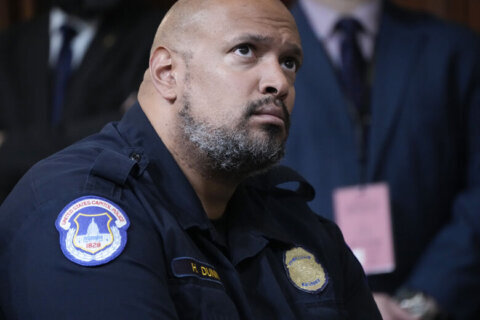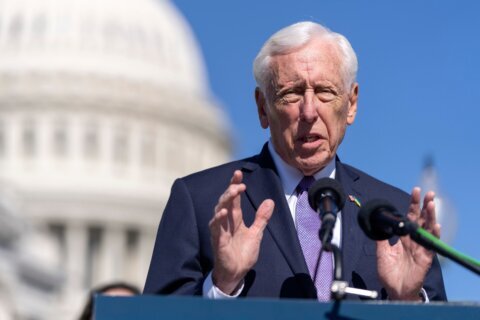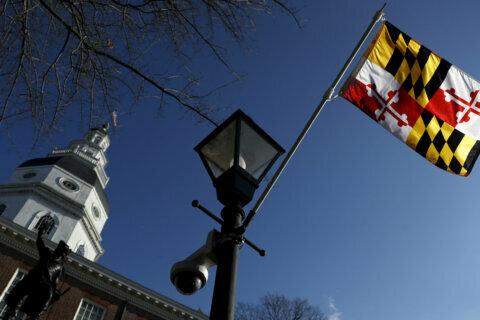Visit WTOP’s Election 2024 page for our comprehensive coverage. Listen live to 103.5 FM for the latest. Sign up for WTOP’s Election Desk newsletter for headlines and analysis from now until Inauguration Day.
With one week until Election Day, the avalanche of political messaging in the presidential and Maryland U.S. Senate races is being fueled by record amounts of cash, much of it from outside the region.
“Candidates need money to run campaigns to reach voters to get their message out through television, radio and digital media — they also still have staff, rent offices and travel around, and have other expenses,” said David Karol, associate professor of government and politics at University of Maryland.
Millions of dollars continue to flow into the race between former Gov. Larry Hogan, a Republican, and Prince George’s County Executive Angela Alsobrooks, a Democrat, who are vying to fill the seat held by departing Democratic Sen. Ben Cardin.
According to OpenSecrets, Alsobrooks has raised over $28 million, spent $25 million and has $2 million cash on hand. Hogan has raised nearly $11 million, spent $9 million and has $1 million on hand, as of Oct. 16 reports.
“This is an unusual Senate race for Maryland, in that it’s competitive between the two parties,” Karol said. “We are a very blue state nowadays, and normally the Republicans would not feel like they had a chance.”
The race to fill Cardin’s seat has cost at least six times more than the state’s last contest to fill a vacant Senate seat — more than $84 million combined in contributions, according to the most recent campaign finance reports filed with the Federal Election Commission.
“The stakes are very high, because control of the Senate can be determined by this race,” Karol said. “The Democrats had owned 51 seats when this Congress started, and they’re losing Joe Manchin’s seat in West Virginia, for sure, so if they lose one more seat, that’s a Republican majority.”
The amount of money raised by the Maryland candidates’ campaign networks are on pace to set records. By contrast, without a competitive challenger, incumbent Cardin raised $5.1 million for his last reelection campaign in 2018.
Where’s the money coming from?
Much of the money being raised in the race between Alsobrooks and Hogan is coming from outside Maryland.
“Campaign finance laws have been weakened, so in effect, very wealthy individuals can contribute really unlimited money, through Super PACs, and through independent expenditures,” Karol said.
Political Action Committees, or PACs, have limits on how much can be donated to a candidate committee or national party committee.
But Super PACs “are committees that may receive unlimited contributions from individuals, corporations, labor unions and other PACs for the purpose of financing independent expenditures and other independent political activity,” according to the FEC.
Why would citizens and groups in other parts of the country contribute in the Maryland race?
“Some of that is from small donors. A huge amount of money is being spent, for example, by small Democratic voters who really hate Ted Cruz, senator from Texas,” Karol said. “But there’s also big money coming in from the Senate Leadership Fund, which is associated with Senate Republican Leader Mitch McConnell, and has been spending in this race.”
One person who has directed money to the Maryland Senate race is Republican Sen. John Cornyn of Texas, who Karol said hopes to succeed Sen. Mitch McConnell and would count on Hogan’s vote, if he were elected.
“Interest groups close to both of the parties have been spending money in this state, so there’s lots of money coming from outside Maryland,” Karol said.
‘Money isn’t everything’
Yet, despite the large amount of money being raised and spent in the presidential and Maryland Senate races, Karol said, “Money isn’t everything in politics. If money was everything, the Senate nominee in Maryland would be David Trone, not Angela Alsobrooks, because he spent an unprecedented amount of money from his own fortune, and ended up losing the primary to her.”
During the Democratic presidential primary in 2020, Michael Bloomberg spent about $1 billion of his own money and only won one contest, in American Samoa.
“He’s not our president now. Joe Biden, who was outspent, not only by Bloomberg, but by several other Democrats, ended up winning that nomination,” Karol said.
“A very rich person can do whatever he or she wants — they may be fighting an uphill battle, they may be delusional,” Karol said. “Small donors, I think act out of emotion, and may support a candidate who has very little chance because mostly they dislike the incumbent.”
While money may not be everything, Karol said it is a good indicator of a winnable or losable race for Hogan and Alsobrooks.
“If you’re getting interest groups spending money, and big donors weighing in, that usually means they see it as a competitive race,” Karol said.
Get breaking news and daily headlines delivered to your email inbox by signing up here.
© 2024 WTOP. All Rights Reserved. This website is not intended for users located within the European Economic Area.








